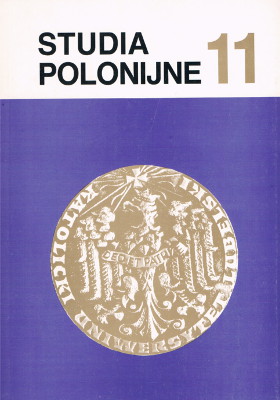The Role of Christianity in the Formation of Polish National Culture
Main Article Content
Abstract
This article is a study of the relation and mutual independence of the Christian religion and Polish culture. After a consideration of a few methodological problems (e.g.: nation and country as the subject of religion, culture and cultures, structural and historical culture, synergism) the author analyses three basic questions: theology of culture in general, and of nation in particular; the relation of Christianity as a religion to Polish culture; the role of the Church in Polish national culture. The question of polonization of Christianity and of the influence of religious truths and Christian principles on Polish culture has been widely discussed in the article. Polonization consisted in the transmission of Biblical salvation into the folk culture on Polish soil (mystery plays, Nativity plays, songs, paraliturgy). Polonization was concerned also with the idea of Messianism, beginning from the XVI c. The latter was understood as a service to other nations and cultures and as defence of the Christian character of Europe.
The author pays attention to the very distinct and specific nature of Polish religiousness and rejects well-known statements of some Polish scientists that Poles were weak and that is why there were no religious wars in Poland and nobody was killed in the name of God. According to the author, Polish culture always had a sense of freedom of a human being and socio-national sovereignty. It used to lead to a defence against determinism and limitations and was often mistaken for individualism. Socio-political freedom was also expressed by the fact that there were many denominations in the Kingdom of Poland. Apart from Catholics, there were the Orthodox, Jews, Ormians, Waldens, Brothers of Free Spirit, Begins, Begards, Hussites, Adamites, Tartarian and Turkish Muslims, Polish Brothers, Calvinists, Lutherans and others. Yet, there were no religious conflicts and Catholics attained posts in the highest Government offices in the Catholic country.
Generally speaking, Christianity was rather connected with the nation and the institutional Church, whereas the upper class with the country. But the Polish Church had a conspicuous ability to transplant Christian principles into the national ones and vice versa, the national principles into the Christian ones. The author submits a proposition that there is no "Christian culture" but only a culture influenced by Christian ideas and motives and also Christianity which remains under the influence of a culture.
Article Details
References
Bartnik Cz.: Idea polskości. Lublin 1990.
Bloch Cz.: Wpływ historii na świadomość narodową i rozumienie dziejów. "Ateneum Kapłańskie" 108:1986 s. 254-272.
Brückner A.: Dzieje kultury polskiej. T. 1-4. Kraków-Warszawa 1946-1958.
Brzozowski M.: Kultura i historyczne uwarunkowania kaznodziejstwa T. Młodzianowskiego. Lublin 1980 (mps KUL).
Chołoniewski A.: Duch dziejów Polski. Wyd. V. Rzym 1946.
Dzieje teologii katolickiej w Polsce. Red. M. Rechowicz. T. 1-3. Lublin 1974-1976.
Gieysztor A.: Mitologia Słowian. Warszawa 1982.
Gloger Z.: Encyklopedia staropolska. T. 1-4. Warszawa 1985.
Historia Kościoła w Polsce. Red. B. Kumor, Z. Obertyński. T. 1-2. Poznań 1974-1979.
Koneczny F.: O ład w historii. Londyn 1977.
Kowalczyk S.: Z problematyki dialogu chrześcijańsko-marksistowskiego. Warszawa 1977.
Literatura polska. Przewodnik encyklopedyczny. T. 1-2. Warszawa 1984-1985.
Polska i Polacy. Red. B. Suchodolski. Warszawa 1983.
700 lat myśli polskiej. Filozofia i myśl społeczna. T. 1-10. Warszawa 1978-1983.
Suchodolski B.: Historia nauki polskiej. T. 1-7. Warszawa 1970-1977.
Tazbir J.: Geschichte der polnischen Toleranz. Warszawa 1977.
Wkład Polaków do kultury świata. T. 1-2. Lublin 1976-1987.
Wyszyński S.: Kazania i przemówienia autoryzowane. T. 1-67. Warszawa 1956-1981.
Zarys historii Polski. Red. J. Tazbir. Warszawa 1979.
Znaniecki F.: Modern Nationalities. London 1952.

